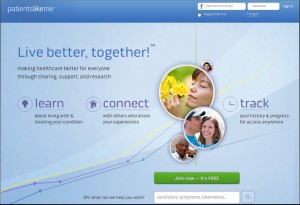
PatientsLikeMe Vice President for Advocacy Sally Okun spoke at TEDMED about the idea of building a "patient lexicon" to make it as easy for patients to talk about their conditions and compare notes as it is for doctors.
"As a pallative care nurse, much of my time was spent in the homes of patients. Sometimes it simply was about giving them the opportunity to say to me 'Is this normal?' 'Do other people feel this?'" she said.
Okun said PatientsLikeMe has developed "a systematic curation process that matches patient vocabulary to clinical vocabulary." When patients describe symptoms on the site, those symptoms are added to an ever-growing analytic database.
PatientsLikeMe began as an online community for ALS patients, but has evolved and expanded to connect patients dealing with many different diseases to track their conditions, therapies, and treatments, generating big data in the process that can inform research and the whole healthcare system. In a recent interview with Fortune, brothers and co-founders Ben and Jamie Heywood revealed that the site currently has 200,000 users in 1,500 disease communities.
"Three years ago the world saw us as just a social network for patients. Now we're a viable clinical-research platform that has published 30 peer-reviewed research studies. We have a much broader population of early adopters, and we're helping clinicians and researchers and patients to develop better and better tools to measure health," Ben told Fortune.
As the platform has moved into its more general use case, its team has been in the spotlight quite a bit lately. In addition to Okun's TED talk and the Fortune interview, co-founder Jamie Heywood was a keynote speaker at the Healthcare Experience Design (HXD) conference in Boston last month. In his talk, he stressed that patients on the platform don't only track symptoms and treatments, but they also record quality of life.
"Healthcare should be a reduction of the severity of the condition and the reduction of the impact of that condition on the patient's life," he said.
He also spoke about how important it is for something to be learned from every patient's treatment, something he believes is largely absent from the present medical establishment.
"I assert that in every medical encounter there are three people," he said. "There is the doctor, there is the patient they're dealing with, and there is the next patient in the room. It should be malpractice to not record what you did in the room to help the next patient. If you're not helping the patient that's not yet sitting there, that patient might die."
Jamie made it clear at HXD that PatientsLikeMe's design priority is patients, not doctors. He pointed to a 1999 Institute of Medicine report which suggested that if it were counted that way, medical errors would be the sixth leading cause of death in the United States -- an indication that the physician-centered system, as is, isn't working as well as it should.
"I don't want to make hospitals better. I don't want to make drug companies better. I want to make the experience of seeking healthcare better," he said, "which means redefining the value chain: what it means to be healthy, what it means to be sick, what it means to live."
















